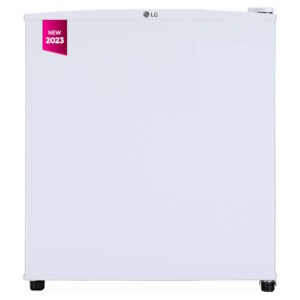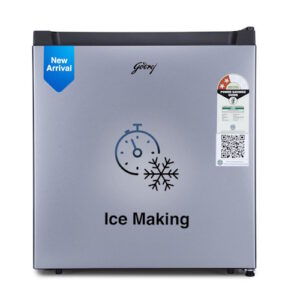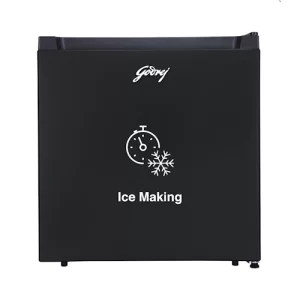Freezers, Refrigerators, Chillers & Water Coolers
- “Godrej 45 L 2 Star Minibar Refrigerator With adjustable Temperature” already exists in your wishlist
-
LG 43 L 4 Star Direct Cool Single Door Mini Refrigerator (GL-M051RSWE, Super White, Fast Ice Making)
- Capacity: 43 litres
- Energy Rating 4 Star
- Warranty: 1 year on product
₹7,695.00 -
Godrej 45 L 2 Star Minibar Refrigerator With adjustable Temperature
Brand Godrej Model RD CHAMP 45B RF GR SL Capacity 45 litres ₹7,399.00 -
Godrej 45 L 2 Star Minibar Refrigerator With adjustable Temperature
Capacity 45 litres Configuration Center Energy Star 2 Star ₹9,489.00 -
Hisense 45 L 4 Star Direct-Cool Single Door Mini Refrigerator
Capacity 45 litres Configuration Internal Freezer Energy Star 3 Star ₹9,489.00
Freezers, Refrigerators, Chillers & Water Coolers: A Comprehensive Guide
Freezers, refrigerators, chillers, and water coolers are essential cooling appliances used in households, commercial kitchens, grocery stores, restaurants, hospitals, and industrial setups. These appliances ensure proper food preservation, beverage cooling, and temperature regulation for various perishable goods. Whether you need a compact refrigerator for home use, a commercial freezer for a restaurant, or an industrial chiller for large-scale cooling, understanding the features and benefits of each category is crucial.
Types of Cooling Appliances
1. Freezers
Freezers are designed to maintain temperatures below freezing (typically -18°C or lower) to store frozen food, ice, and perishable goods. There are different types of freezers available for residential and commercial use:
- Chest Freezers – Provide deep storage capacity and energy efficiency.
- Upright Freezers – Offer organized shelving and easy accessibility.
- Commercial Deep Freezers – Built for high-volume storage in grocery stores, restaurants, and bakeries.
- Blast Freezers – Used in the food industry to rapidly freeze perishable goods and retain freshness.
2. Refrigerators
Refrigerators maintain temperatures between 0°C and 4°C to keep food and beverages fresh. They are available in various types:
- Single-Door Refrigerators – Compact and ideal for home use.
- Double-Door Refrigerators – Provide separate compartments for refrigeration and freezing.
- Side-by-Side Refrigerators – Feature large storage capacity and advanced cooling technology.
- Commercial Refrigerators – Designed for hotels, restaurants, and catering businesses to store perishable ingredients efficiently.
3. Chillers
Chillers are used in industrial and commercial settings to regulate temperature and keep liquids or air cool. Types include:
- Air-Cooled Chillers – Use air to dissipate heat, ideal for HVAC systems and manufacturing plants.
- Water-Cooled Chillers – More efficient for large-scale cooling applications.
- Beverage Chillers – Maintain optimal temperatures for drinks and perishable food products in supermarkets and restaurants.
- Glycol Chillers – Used in breweries and wineries for temperature control in fermentation.
4. Water Coolers
Water coolers are used to dispense chilled drinking water. Common types include:
- Bottled Water Coolers – Use replaceable water bottles for cooling and dispensing water.
- Point-of-Use (POU) Water Coolers – Connected to a direct water line for unlimited cooling.
- Bottom-Load Water Coolers – Feature an easy-load design to replace water bottles effortlessly.
- Industrial Water Coolers – Designed for large-scale hydration in workplaces and manufacturing units.
Key Features to Look For
1. Energy Efficiency
Modern freezers, refrigerators, chillers, and water coolers come with energy-saving technology such as inverter compressors, eco-friendly refrigerants, and smart sensors to reduce power consumption.
2. Advanced Cooling Technology
Look for features like multi-airflow systems, frost-free operation, and digital temperature controls to ensure even cooling and long-lasting freshness.
3. Storage Capacity & Design
Choose a model that fits your space and storage needs, whether you require a compact fridge for a small kitchen or a high-capacity commercial freezer.
4. Durability and Build Quality
Opt for stainless steel, corrosion-resistant exteriors, and durable shelving for long-lasting performance.
5. Smart Features
Many modern cooling appliances offer WiFi connectivity, touch-screen panels, and auto-defrost functions for convenient operation.
Benefits of Using High-Quality Cooling Appliances
- Preserves Food Freshness – Maintains the right temperature to prevent food spoilage.
- Improves Energy Savings – Reduces electricity consumption with efficient cooling systems.
- Enhances Storage Organization – Adjustable shelves and compartments for better organization.
- Ensures Hygiene and Safety – Keeps perishable goods safe for consumption.
- Provides Convenient Access to Cold Water – Water coolers ensure a constant supply of fresh, chilled drinking water.
Maintenance Tips for Long-Lasting Performance
- Regular Cleaning – Clean the interior and exterior surfaces to prevent bacterial growth.
- Check the Temperature Settings – Maintain optimal temperature settings to avoid food spoilage.
- Defrost When Needed – Remove ice buildup in freezers to maintain efficiency.
- Inspect the Door Seals – Ensure proper sealing to prevent cold air leakage.
- Service the Cooling System Annually – Get professional maintenance for commercial and industrial units.
Frequently Asked Questions (FAQs)
1. What is the difference between a refrigerator and a chiller?
A refrigerator maintains temperatures between 0°C and 4°C for food storage, while a chiller is designed to cool liquids or air in industrial and commercial applications.
2. How can I reduce energy consumption in my freezer or refrigerator?
You can reduce energy use by keeping the appliance full, maintaining proper ventilation, avoiding frequent door openings, and using an energy-efficient model with inverter technology.
3. What is the ideal temperature setting for a commercial refrigerator?
The ideal temperature setting for a commercial refrigerator is between 1°C and 4°C to ensure food safety.
4. How often should I clean my water cooler?
It is recommended to clean and sanitize your water cooler every 4-6 weeks to ensure safe drinking water.
5. What type of freezer is best for a restaurant?
A commercial deep freezer or blast freezer is ideal for restaurants, as they provide high storage capacity and rapid freezing.
6. Are air-cooled or water-cooled chillers better?
Air-cooled chillers are easier to install and maintain, while water-cooled chillers are more efficient for large-scale cooling applications.
7. Can I use a domestic refrigerator for commercial purposes?
No, domestic refrigerators are not designed for high-volume usage and may not maintain consistent temperatures required for commercial food storage.
8. What is the lifespan of a commercial freezer?
A well-maintained commercial freezer can last 10-15 years, depending on usage and servicing.
9. How does a bottom-load water cooler work?
A bottom-load water cooler uses a pump to draw water from a bottle placed at the base, making it easier to replace without lifting heavy bottles.
10. Do I need a frost-free freezer?
Frost-free freezers are convenient as they prevent ice buildup, eliminating the need for manual defrosting.
Conclusion
Investing in high-quality freezers, refrigerators, chillers, and water coolers is essential for food preservation, beverage cooling, and industrial applications. Whether for home, commercial, or industrial use, selecting the right cooling appliance ensures efficiency, convenience, and long-term savings. By considering factors such as energy efficiency, cooling technology, storage capacity, and maintenance requirements, you can choose the perfect model that suits your needs.
With a wide range of options available, from compact refrigerators to large-scale industrial chillers, making an informed decision will help you optimize performance and improve overall cooling efficiency.




